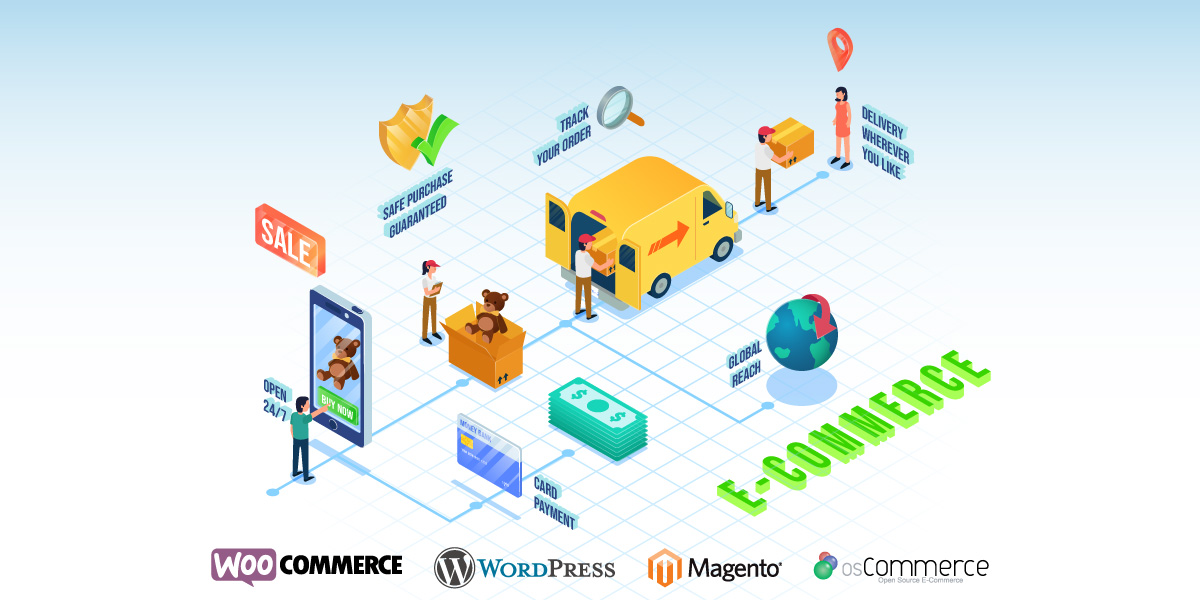
- Alex S.
- 17,Apr 2019
- Ecommerce
The e-commerce industry is on the edge of expansion as the year 2018 observed around 50% growth of the digital buyers. E-commerce companies must search the support, functionality, extensions, cost of development and maintenance of the website.
As till now, we have almost used every E-Commerce CMS Platform we always ask the client to let us know his current and future expectation that he/she having from the Website so can suggest him/her the best E-Commerce CMS.
Below is the list of some of the popular CMS platforms and as a prospect E-Commerce startup, you can choose the best one according to your requirement.
WooCommerce
It helps in building the E-Commerce website on the WordPress platform. The WooCommerce is an open-source platform that provides varied plugins for E-Commerce websites. It works well for the small business houses or the individuals who are familiar with functions of WordPress.
Advantages
Free
The first WooCommerce WordPress pros you must know is that it not costs you a thing. You just need to download it and wait a few minutes to have it.
Familiar
Secondly, if you have purchased anything online, I’m sure you have had experience with this plugin before. With a familiar platform, it is really easy to use with past users.
Professional and Customizable
Next, Woocommerce WordPress pros are professional and customizable. This advantage puts the Woocommerce on the different side with other apps and plugins. There are many themes with further modified color for you to customize your website. So you can build your unique website for your own business.
Secure
The POS of this platform must be the great thing you can find. It is regularly updated to take away your worry about security issues and bugs. Large community support: the other pros of WooCommerce WordPress platform must be the community support where you can find the advice for all your problems. Now you can weed out all the bugs and other problems easier than ever.
Disadvantages
The frequency of WordPress updates
The most dissatisfied about the Woocommerce WordPress must be about the updates. You have to keep the WordPress plugin up to date with your current browsers. But sometimes the WooCommerce platform does not meet the updates; then you can operate some plugins as usually.
Can be costly
Even WordPress and WooCommerce are totally free, and there are a variety of choices of WordPress themes, sometimes these themes don’t meet your need. If you want to make changes to the layout of the theme, it may take your time to do on your own or take your money to have programmers do your work.
Require knowledge to effectively use
Last but not least disadvantage of this plugin must be the requirement of knowledge to use it effectively. Sometimes when you want to update the store, it is hard for you to do by yourself if you don’t have the knowledge of both Woocommerce and WordPress. WooCommerce service providers or an expert developer is needed in this case.
Magento
Magento is mainly not used by small business houses. Magento is built to be flexible and scalable. eCommerce consultants tout it as one of the premier open source eCommerce solutions in the game. With over 125,000 sites and Fortune 500 companies under its name, it certainly is popular. However, is it right for you? Here are some advantages and disadvantages to consider.
Advantages
Feature-rich
The Community (free) version boasts features not commonly available in other solutions such as the ability to manage multiple storefronts, multi-language and multi-currency support and is mobile and search engine friendly.
User-friendly
The administration area is one of the more user-friendly ones we’ve come across. A simple back-end with intuitive navigation and well-organized store management features.
Cost
Community version is free.
Flexibility
Magento’s templating architecture allows you to pretty customize everything so you can create your site exactly how you want The software is open source so you have full control over the code so you can develop the functionality you need.
Scalable
As previously mentioned, Magento is built to scale so whether you’re selling 10 products or 10,000, Magento can handle it.
Disadvantages
Developers
Good Magento developers are hard to find. Magento is an extremely large system (over 20,000 files and 200 database tables) so it takes a fairly cluey developer with a good understanding of object-oriented development and experience with the core software to really know what they’re doing.
Cost
Community version is free but if you want to support, the Enterprise version starts at US$14,420/year (at time of writing) and the Premium Enterprise version starts at US$49,990/year (for large businesses). Good Magento developers are often much pricier than the average ones.
Hosting
Due to its largesse, Magento should only be hosted on dedicated servers that you can configure or providers who specialize in Magento hosting. Running Magento on normal shared hosting will create a slow and frustrating user experience for visitors.
Time
Magento’s flexible architecture also makes it complex. It usually requires more time to make the same customizations as in other solutions. It usually takes developers more time to get up the learning curve than other solutions.
Drupal Commerce
Drupal falls in second place after WordPress as a CMS platform in terms of popularity among site development agencies for building an e-commerce site. Drupal Commerce is the plugin for designing E-Commerce based websites. It is simpler to build a forum or blog with Drupal as compared to other Content Management Systems.
Advantages
- For content marketing and blog integration, Drupal CMS platform works well over other platforms
- Easier Implementation of the SEO strategy
Disadvantages
- The main drawback of using Drupal as the community is not much active.
OsCommerce
This CMS platform is used by the top 11% of the companies worldwide. The OsCommerce has a great support base, as it is one of the earliest open CMS platforms. Top 100,000 sites are built on this open-source technology. Few users are of the view that the updates for this platform are not kept abreast with the passage of time.
Advantages
- Large support base and an active forum
- Easy-to-use interface
- Easier installation
- Allows the additional functionalities as it has numerous add-ons and plugins
Disadvantages
- The designs and the software updates are found to be outdated by most of the users
Conclusion
So, in conclusion, we would like to share that before or while sharing your E-Commerce concept to any developer double check or think about your current expectation and future expectation and if possible try to understand all the E-Commerce CMS platform. As a Client, you can do the brain-storming session with the developer for sure.
Skype: alex_39799
Google Hangout: alex.igex@gmail.com
WhatsApp: +91 6353 937 367
Web Portfolio
Mobile Portfolio
Categories
What good is an idea if it remains an idea? Let's put efforts together to give it a look of Website or Mobile Application.
Let’s Start a discussion









